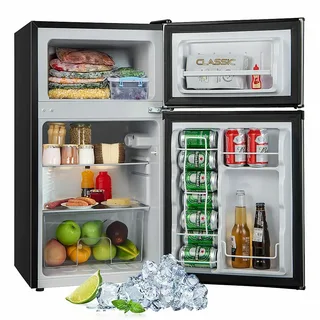Compact refrigerators have become increasingly popular in recent years, especially among students, small apartment dwellers, and office workers. These smaller appliances offer a convenient way to store food and beverages without taking up too much space. However, like any product, they come with their own set of advantages and disadvantages. In this article, we will explore the pros and cons of owning a compact refrigerator to help you decide if it’s the right choice for your needs.
What Is a Compact Refrigerator?
A compact refrigerator, also known as a mini fridge, is a smaller version of a traditional fridge, typically ranging from 1.7 to 4.5 cubic feet in capacity. These units are designed to fit in limited spaces such as dorm rooms, offices, or bedrooms, providing basic refrigeration capabilities without the bulk.
The Pros of Owning a Compact Refrigerator
Space-Saving Design
One of the biggest advantages is the space-saving design. Compact refrigerators are perfect for small living areas where a full-sized fridge wouldn’t fit. This makes them ideal for studio apartments, dormitories, or shared offices.
Energy Efficiency
Compact refrigerators generally consume less energy compared to full-sized refrigerators. Because of their smaller size, they require less power to operate, which can help reduce electricity bills.
Portability and Convenience
Many compact refrigerators are lightweight and easy to move, allowing for portability. This makes them convenient for travel, temporary housing, or even outdoor events.
Cost-Effective
Compact refrigerators are usually more affordable upfront compared to larger models. For those on a budget or who don’t need extensive refrigeration space, this makes owning a compact refrigerator a financially smart option.
The Cons of Owning a Compact Refrigerator
Limited Storage Capacity
A major drawback is the limited storage space. Compact refrigerators cannot store large amounts of food or bulky items, which can be a problem for families or individuals who cook frequently.
Less Efficient Cooling
Due to their size, some compact refrigerators may struggle to maintain consistent cooling, especially if they are overfilled or opened frequently. This can impact the freshness of stored items.
Noise Levels
Some compact refrigerators tend to be noisier than full-sized models, which might be disruptive in quiet environments like bedrooms or offices.
Fewer Features
Unlike larger refrigerators, compact models often lack advanced features such as ice makers, adjustable temperature zones, or large freezer compartments.
Is a Compact Refrigerator Right for You?
Understanding the pros and cons of owning a compact refrigerator can help you make an informed decision. If you prioritize saving space, energy efficiency, and portability, a compact fridge might be a great fit. However, if you need ample storage and advanced cooling capabilities, a full-sized refrigerator could be more suitable.
Ultimately, the choice depends on your lifestyle, space availability, and specific refrigeration needs.
Conclusion
Considering the pros and cons of owning a compact refrigerator is essential before making a purchase. While compact refrigerators offer convenience, affordability, and energy efficiency, their limited capacity and cooling capabilities might not suit everyone. Evaluate your needs carefully to decide if a compact fridge is the right appliance for you.


